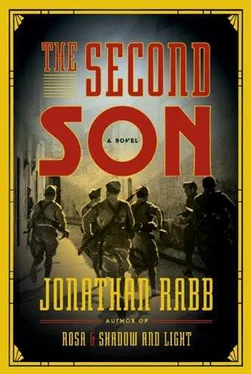Jonathan Rabb - The Second Son
Здесь есть возможность читать онлайн «Jonathan Rabb - The Second Son» весь текст электронной книги совершенно бесплатно (целиком полную версию без сокращений). В некоторых случаях можно слушать аудио, скачать через торрент в формате fb2 и присутствует краткое содержание. Жанр: Политический детектив, на английском языке. Описание произведения, (предисловие) а так же отзывы посетителей доступны на портале библиотеки ЛибКат.
- Название:The Second Son
- Автор:
- Жанр:
- Год:неизвестен
- ISBN:нет данных
- Рейтинг книги:4 / 5. Голосов: 1
-
Избранное:Добавить в избранное
- Отзывы:
-
Ваша оценка:
- 80
- 1
- 2
- 3
- 4
- 5
The Second Son: краткое содержание, описание и аннотация
Предлагаем к чтению аннотацию, описание, краткое содержание или предисловие (зависит от того, что написал сам автор книги «The Second Son»). Если вы не нашли необходимую информацию о книге — напишите в комментариях, мы постараемся отыскать её.
The Second Son — читать онлайн бесплатно полную книгу (весь текст) целиком
Ниже представлен текст книги, разбитый по страницам. Система сохранения места последней прочитанной страницы, позволяет с удобством читать онлайн бесплатно книгу «The Second Son», без необходимости каждый раз заново искать на чём Вы остановились. Поставьте закладку, и сможете в любой момент перейти на страницу, на которой закончили чтение.
Интервал:
Закладка:
She said, “Do you think that’s what I’m asking? Do you think I don’t see that?”
Hoffner had no bearings for this. His head was suddenly light, the sound of voices behind him-somewhere-beginning to vibrate unrelentingly. He felt his arm go weak, then his legs. He let go of her and reached for the wall, the scarred stone scraping into his hand, the pain a momentary relief. He heard his own breath-deep and heavy-saw himself crouching, then sitting on the stone. He had an instant of nausea and then great thirst. His eyes tried to find their focus, movement somewhere in front of him, when he saw her, on her knees. She was doing something with his neck or throat or tie. It was the tie. And then the cold tin of the canteen on his lips, and water, the stream of it flowing down to the pit of his stomach. He looked at her as she doused his handkerchief with water and set it at the back of his neck. His head throbbed.
She turned to the courtyard below and said, “The heat. He’s not used to it.” Hoffner noticed people behind her. They were staring, nodding. She said, “I’m a doctor. It’s fine.”
They moved off, and Hoffner felt his arms again. “It’s not the heat,” he said.
She moved the handkerchief to his brow and squeezed it, and the water ran down his face. “I know,” she said. “But maybe it is just a little.”
He took her hand and felt the dampness of it.
With her other, she placed two fingers under his jaw and felt for his pulse. Hoffner looked into her face, the color gone, the beads of sweat creasing her cheeks and lips. He said, “I won’t choose-”
“You should stop talking.”
“You don’t understand.” He needed her to know this. “I won’t have this be a choice.”
“I’m not asking you to.”
“No. You have to see what I’m saying, what I need from you.”
She stopped and stared into his eyes. “What you need from me you have. What you need from me isn’t a question. There are no choices.”
“I have to find him.”
Her gaze softened. “You really don’t understand this, do you?” Hoffner tried to answer, and she said, “Of course we find him. What did you think-just because I tell you you’re an idiot when it comes to a man like Alfassi it means more than that? You are an idiot when it comes to Alfassi, and you have no idea what this war is about, but why would that change anything? Wouldn’t it have been worse if I hadn’t screamed a little after that?”
Hoffner felt a relief he had no hope of understanding. “I thought-”
“Yes. I know. But I’m allowed to tell you how sad and desperate this war makes me, Nikolai. And I need to know you won’t collapse every time I do.” She handed him the canteen again. “But I’m glad you thought it was a choice. Now drink.”
Hoffner drank and felt his strength returning. He waited another half minute and drank again.
She said, “You’re all right?”
He took a last drink and handed her the canteen. He nodded and got to his feet.
He said, “It’s nice to know I’m an idiot.” His legs felt heavy but at least they were there.
“He’s a Spaniard with a conscience. It’s easy to be fooled.” She took a drink and saw something down in the courtyard. She slipped her arm through his. “We should get you something with salt. I could use some myself.” They began to walk.
He said, “So when did conscience become such a terrible thing?”
“You’ve been living in Germany too long. The fascists there don’t bother with it.”
“And here?”
She slipped her hand farther down his arm and took his hand. “Here Alfassi has God and truth and what he takes for compassion. His is a fascism that breeds inspiration.” Her fingers curled through his, and Hoffner gripped at them. “If he manages to win this war, you can be sure he and his friends will be here long after your thousand-year Reich is dust. Alfassi knows it-brutality as brutality runs its course-but a man of conscience, gentility, kindness? He can breathe life into brutality again and again and make it seem almost humane. It’s a particularly Spanish cruelty and we’ve had centuries to become very, very good at it.”
They came to a little awning, two tables and three chairs. A curtain, made of strings of bamboo beads, hung across the open door to keep out the flies. They sat, and Mila said into the curtain, “Two beers and an order of migas , please.”
A voice grunted acknowledgment. Hoffner didn’t know migas .
“Bread crumbs,” she said. “Like porridge, with bacon or chorizo or whatever they have lying around. It’ll be good for you.”
He nodded and pulled out his cigarettes.
“I wouldn’t,” she said. “Not until you get something in your stomach.”
Hoffner set the pack on the table. He kept his eyes on it as he placed his hand on hers. The knuckles were wonderfully smooth.
He said, “You don’t expect this, do you?”
He waited for her to answer. When she didn’t, he looked up. She was staring across at him. Hoffner felt his head go light again, until he saw the smile curl her lips.
She said, “And what is it you didn’t expect?”
For some reason he had no idea what he had been meaning to say. None. He shook his head quietly, and watched as her smile grew.
“It must be terrible,” she said easily, “to feel something and not have the courage to admit it, even to yourself. I’m not asking you to. I have no such cares about love. It doesn’t make me weak or sad or hopeful or carefree. I’ll leave that to the young. All I know is when it comes. And how rare it is. And that makes it even more certain.”
Hoffner felt her hand under his, and he found his voice. “Yes,” he said. “That’s right. I think … that’s right.”
The bamboo beads swayed, the plates arrived, and they ate.
Major Sanz proved to be a man of little conscience. He was cut from the same cloth as Captain Doval and kept his interviews brief.
And so, knowing that the telephone lines might reengage at any moment-and perhaps still a little lightheaded-Hoffner barreled on. He showed Sanz the Safe Conduct papers, he mentioned Alfassi and Doval, and he explained his role with the contact names in each of the cities to the west.
Naively, Sanz said he thought Georg had been a journalist. Hoffner quickly disabused him of this: Georg was a member of German Intelligence-why not? The SS had lost track of him. He had been heading into Republican territory to secure the routes and the contacts.
Major Sanz was only too happy to confirm them.
More remarkable, though, was Sanz’s request for thinner crates. Naturally, Hoffner had no idea what the man was talking about.
“For the rifles,” Sanz said, as if speaking to a child. “You’re getting twelve-not even that-into each one.” Hoffner’s expression prompted further details. “The wood is too thick. Use a thinner wood and you get maybe eighteen, even twenty inside. It’s not so important here in Teruel. We can leave the crates out in the open, have as many as we like. Who’s going to care? But you go west-Cuenca or, my God, think of Toledo-and the more crates you have, the more difficult it will be to keep them hidden. You see what I’m saying?”
Hoffner did not, until Sanz showed him the printed packing slip that had accompanied the crate.
At the top, in an official script, was the crate’s origin: Tetuan, Morocco. Just below, in the same script, was the name of the company that had shipped it: Hispano-Marroqui de Transportes, Sociedad Limitada. Elsewhere on the slip, the company was simply referred to as Hisma.
Hoffner stared at the word. It was the final name from Georg’s wire, the name connected to Bernhardt and Langenheim.
Hoffner said, “You have other papers from the company, Major?”
Читать дальшеИнтервал:
Закладка:
Похожие книги на «The Second Son»
Представляем Вашему вниманию похожие книги на «The Second Son» списком для выбора. Мы отобрали схожую по названию и смыслу литературу в надежде предоставить читателям больше вариантов отыскать новые, интересные, ещё непрочитанные произведения.
Обсуждение, отзывы о книге «The Second Son» и просто собственные мнения читателей. Оставьте ваши комментарии, напишите, что Вы думаете о произведении, его смысле или главных героях. Укажите что конкретно понравилось, а что нет, и почему Вы так считаете.












